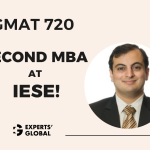Verbatim
Experts’ Global: Hi Abinash, thanks for making the time to speak with us! Could you share your story in your words?
Abinash: Sure! My first attempt at the GMAT was suboptimal, as I had undertaken very little prep due to my full-time employment and the misconception that my math and English skills were adequate. My subsequent attempt at the GMAT in September 2019 got me a 690, a much-improved score that I used for my subsequent school applications.
Experts’ Global: In your opinion, what factors led to your success?
Abinash: The GMAT is not like a regular entrance exam. The scope of one’s competition is global, and the preparation needs to be mapped accordingly. On my second GMAT attempt, I made sure to upgrade my studies via Experts’ Global’s GMAT practice tests. In this manner, I was able to identify my particular conceptual strengths and weaknesses. I also reached out to friends who had already taken the GMAT and tried to incorporate their advice into my prep routine.
Experts’ Global: What area of the GMAT presented the most difficulties and how did you overcome the same?
Abinash: I struggled with Quant in the beginning, as I was complacent in my high school math skills, but was unable to sufficiently conquer the GMAT’s questions. Building the correct problem-solving approach to tackle GMAT Quant was essential. I used a GMAT online course and public discussions on GMAT Club for the same.
Experts’ Global: What resources did you use for your GMAT prep and what advice for applicants do you have about the same?
Abinash: The GMAT official material must be your primary reference point. I also used a free GMAT practice test or two, completed all of Experts’ Global’s mocks, and referred to active conversations around sticky questions on GMAT Club. I also used YouTube to dive deeper into certain trickier GMAT concepts.
Experts’ Global: What number and frequency of GMAT mock attempts should MBA applicants target?
Abinash: That is a good question and one I wish I paid greater attention to before my first GMAT attempt because I only took the two official mocks you get after signing up for the exam as part of my prep. For my subsequent attempt, I would take a mock once every weekend over the four months of my prep. I sat through the entire three-hour stretch every time. When I took the actual GMAT, I scheduled it over the approaching weekend because that was what my body had grown used to.
Experts’ Global: What common mistakes should all GMAT aspirants avoid?
Abinash: I believe that procrastination is often an issue that derails one’s GMAT prep. The mindset that one needs to take the actual GMAT is developed through the rigor of one’s studies for the test. You need to build habits regarding sitting through the entire length of the test without mental fatigue.
Try and structure your GMAT prep in a way that you can identify your weaknesses and then tap the necessary resources to fill in the same. Aspirants often make the mistake of not doing enough to cover for their weaknesses prior to the GMAT.
Experts’ Global: How was your experience with applying to business schools and what things did you do correctly to secure your admits?
Abinash: From the process of applying to business schools, I learned that starting your MBA journey, including GMAT prep, a year before your targeted programs’ Round one deadlines is a good idea. Around six months are required to take the GMAT and get your targeted score thereon, and after that, you can begin your research on how certain schools mesh with your career goals and profile USPs. Therefore, filling out the different application forms, drafting the essays, and preparing for the interviews from the schools that shortlist your candidature is also time-consuming.
The decision to be in-depth with my school research, and to form relationships with alumni and current students from my targeted MBA programs beforehand to get a sense of the schools’ ethos was a good one. It was also beneficial to be clear-cut on my financials and the feasibility of the costs involved in different programs for me, so that I could find an MBA with the highest ROI.
Experts’ Global: How was your MBA interview experience?
Abinash: I got interview calls from three of the four business schools I applied to. The kind of questions I encountered across all the interviews were of three different varieties. One kind of question is about getting to know a candidate’s personal interests and life history, another kind is about the work experience and professional lessons that a candidate holds, and the third is behavioral and situational in nature. My MBA interview prep helped me have a framework in place to tackle all three kinds of queries with ease!
Experts’ Global: What was your MBA experience like?
Abinash: My MBA experience at HHL was fantastic. The program itself is one with a rich legacy of over 135 years old, and has a great deal of flexibility regarding the courses a student can take therein. The faculty teaching us during the MBA are all highly reputed and excellent at what they do. The many interest and professional clubs at HHL empowered us to connect with relevant industry experts and build relationships therefrom.
Above all else, I am grateful for the cultural exposure and peer support the MBA enabled. My MBA class consisted of students from over different 18 countries, and the chance to develop a global perspective through classmate conversations was priceless!
Experts’ Global: How was the post-MBA job search and do you have any advice for other MBA aspirants about the same?
Abinash: Start off with the MBA job search by having some idea of the industry in which you wish to build a career. The MBA also allows you to explore the many employment options available after the program, and sometimes certain courses in your MBA can take your goals in new directions.
In my case, I built on my experience in project management and consulting by acquiring certifications such as Scrum and PMI. I also took on an internship as soon as I could after the MBA started to get a sense of the German work culture. Getting ready to apply for full-time employment thereafter required me to be prepared for job interview processes, and my lessons from the pre-application journey were useful therein!
Experts’ Global: What is your final message to MBA aspirants out there?
Abinash: The MBA is a truly life-changing experience. It can open up your perspective on different cultures and expand your expertise in problem-solving. The effort and investment it takes to get into a good business school is absolutely worth it. Take the time to cultivate your profile and reach out to MBA admissions consultants if you feel the need, and do all you can to optimize your chances of MBA success!
Experts’ Global: Thank you for sharing the lessons of your journey with us today, Abinash!
Abinash: I hope that I am able to help other MBA applicants through our conversation!







